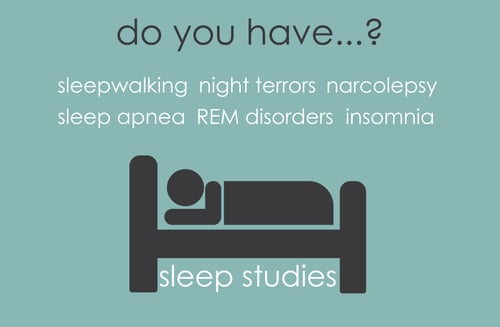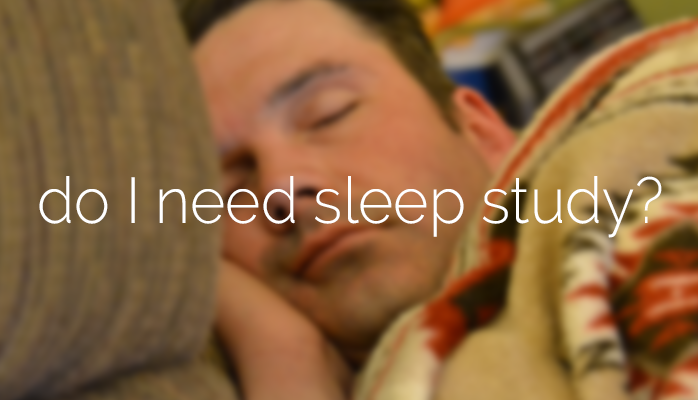Signs That I Need a Sleep Study
For many of us, the idea of having a sleep study is an exotic “wouldn’t that be interesting?” kind of thing. However, countless examples of recent research on the importance of sleep are bringing sleep studies into the mainstream. I personally know several people whose lives have been changed by sleep studies. Sleep quality is critical for everything, from peak athlete performance to heart health to brain health.
However, sleep time does not always equate to sleep quality. There are numerous signs that you might need a sleep study, regardless of what time you go to bed and wake up. Some signs that your sleep quality is poor are:
-
Excessive daytime sleepiness
-
Unexplainable, consistent malaise and fatigue
-
Daily irritation, anxiety, or mood swings for no clear reason
-
Difficult concentrating, such as “brain fog”, or cognitive impairment
-
Decreased sex drive
-
Poor performance at work (regardless of the occupation, as sleep affects performance at every output)
-
Stress without a clear reason
-
Obesity without clear reason
-
High blood pressure
-
Heart disease
-
Heart attack
-
Irregular heart beat
-
Diabetes
-
Morning headaches
In other words, if you have generally been feeling down and out for no clear reason, it might be time to do a sleep study. Quality sleep means you are there for your spouse, family, and friends. They want the happy you, not the crabby, tired you.
What Problems Sleep Studies Identify

Commonly, sleep studies attempt to identify:
-
Sleep apnea
-
Narcolepsy
-
Insomnia
-
REM sleep behavior disorders
-
Limb movement disorders
-
Sleepwalking
If a physician has recommended that you seek a sleep study or the above list of signs seems all-to-familiar, you can get a free sleep consultation here.
What Will a Sleep Study Tell Me
A sleep study, also known as a polysomnography, records information that allows the sleep physician to evaluate your sleep stages and their sequence during your nighttime sleep.
Your sleep study records your:
-
Brain activity through electroencephalogram (EEG)
-
Repertory and heart activity
-
Eye movements
-
Muscle movements
Your EEG data tells us how quickly you fall asleep and the presence of early onset Rapid Eye Movement (REM). This may suggest sleepiness and a possible disorder of alertness.
Airflow through the nose and mouth informs us if there are abnormalities that indicate sleep apnea.
Recording heart rate, oxygen saturation, airflow, and respiratory effort allows us to evaluate how any breathing abnormalities you might have impacts your:
-
Brain oxygenation
-
Cardiac function
-
Sleep continuity
Limb movements are recorded to detect extraneous movements. Extraneous movements might be normal or caused by potential seizure activity.
In-lab sleep studies are recorded on video so that sleep talking and unusual behaviors can be documented. Home sleep apnea tests collect data that a physician requires to diagnose sleep apnea. This usually consists of your breathing and blood oxygen level.
How Does a Sleep Study Work – What to Expect
Though the idea of a sleep study may sound rather exotic, a sleep study is actually a very normal experience. A sleep study is a non-invasive, overnight exam that allows doctors to monitor you while you sleep to see what's happening in your brain and body.
The process for a sleep study is simple. It looks like this:
-
You will go to a sleep lab, such as a sleep center, for an overnight stay
-
Equipment, such as sensors, will be placed on your head/body, but there is plenty of room to get comfortable (the sleep technician will work with you to address any discomfort)
-
While you sleep, an EEG monitors your sleep stages and the cycles of REM and nonREM (NREM) sleep you go through during the night
-
Other equipment will also measure things such as:
-
Eye movements
-
Oxygen levels in your blood (through a sensor—there are no needles involved)
-
Heart and breathing rates
-
Snoring
-
Body movements
-
-
Your sleep study will be conducted in a comfortable room that is dark and made for sleeping
-
After your sleep study, your sleep study physician or primary physician will go over your results with you, usually within two weeks of your study
It’s that simple.
The room you conduct your sleep study in might even be more comfortable than your room at home! You can take a tour of your sleep center before your study to see how comfortable accommodations are.
How to Prepare for Sleep Study (Dos and Don’ts)
There’s nothing special needed to prepare for your sleep study. The idea is to get as “normal” a sleep as you would usually get. Here are a few things you should know when coming to your sleep study that might answer your questions about a sleep study.
What to bring:
-
Bring and take all of your regular prescribed medications according to your physician's instructions
-
Bring sleeping clothes such as pajamas or shorts and a t-shirt. Although your comfort is very important, most clinics prefer you not to sleep naked the night of the study
-
Bring a favorite pillow or blanket if desired
-
Bring any other specialty items you may need for sleep or will need first thing in the morning such as toiletries, toothpaste, toothbrush, hair dryer, etc.
-
Bring an overnight bag, such as if you were staying at a hotel
How to prepare:
-
Arrive with clean hair – no hair sprays, oils, gels, etc.
-
Arrive a couple of hours before bedtime
-
Try to avoid naps during the day
-
Try not to eat anything after your evening meal the day of the study
-
Try and avoid caffeine after lunch the day of the study
-
Avoid alcohol on the day of the study
-
Let the clinic know ahead of time if you have any special needs (e.g. trouble getting in/out of bed, any physical limitations, nocturnal enuresis, impairments, etc.)
-
As said, bring an overnight bag like you were staying at a hotel
To get the best results out of your sleep study, sleep centers want you to go about your usual evening routine as much as possible. The above points can help you make the study go more smoothly and garner the most accurate results. If you think that you need a sleep study, or would like to learn more about our sleep studies, then please click the link below.

